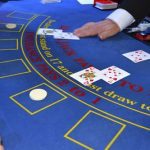
Poker psychology is an essential aspect of the game that involves understanding the mindset and emotions of players. It is crucial to have a clear understanding of how emotions and mindset can affect a player’s decision-making process and overall performance at the table. In this article, we will explore the importance of poker psychology and how it can help players improve their game.
The Importance of a Positive Mindset in Poker Psychology
Poker is a game of skill, strategy, and psychology. While mastering the technical aspects of the game is important, it is equally important to understand the psychological aspects of poker. In particular, having a positive mindset is crucial to success in poker.
A positive mindset means having a can-do attitude, being optimistic, and having a belief in oneself. It is important to have a positive mindset in poker because the game can be mentally challenging. Players must be able to handle the ups and downs of the game, deal with bad beats, and stay focused for long periods of time.
One way to develop a positive mindset is to focus on the process rather than the outcome. Instead of worrying about winning or losing, focus on making the best decisions possible. This means analyzing the situation, considering the odds, and making a decision based on logic rather than emotion.
Another way to develop a positive mindset is to practice mindfulness. Mindfulness is the practice of being present in the moment and aware of one’s thoughts and feelings. By practicing mindfulness, players can learn to recognize negative thoughts and emotions and replace them with positive ones.
Positive self-talk is also important in developing a positive mindset. Instead of criticizing oneself for mistakes, players should focus on the positive aspects of their game. This means acknowledging successes and learning from mistakes rather than dwelling on them.
In addition to having a positive mindset, it is important to manage one’s emotions in poker. Emotions can be a powerful force in poker, and they can either help or hinder a player’s performance.
One emotion that can be particularly detrimental in poker is tilt. Tilt is a state of emotional frustration that can occur when a player experiences a bad beat or a series of losses. Tilt can cause a player to make irrational decisions and play poorly.
To avoid tilt, it is important to recognize the signs of tilt and take steps to manage it. This may mean taking a break from the game, practicing mindfulness, or using relaxation techniques such as deep breathing or visualization.
Another emotion that can be challenging in poker is fear. Fear can cause a player to play too conservatively or make decisions based on emotion rather than logic. To overcome fear, it is important to have a solid understanding of the game and to trust one’s instincts.
Finally, it is important to manage one’s ego in poker. Ego can cause a player to make decisions based on pride rather than logic. This may mean taking unnecessary risks or refusing to fold a hand even when it is clear that it is the right decision.
To manage one’s ego, it is important to stay humble and to focus on the process rather than the outcome. This means acknowledging mistakes and learning from them rather than blaming others or making excuses.
Having a positive mindset and managing one’s emotions are crucial to success in poker. By focusing on the process, practicing mindfulness, and managing emotions such as tilt, fear, and ego, players can improve their performance and achieve greater success at the table.
Managing Emotions at the Poker Table: Tips and Strategies
Emotions can run high in poker, and it’s easy to get caught up in the moment. Whether you’re on a winning streak or a losing streak, it’s important to keep your emotions in check. Here are some tips and strategies for managing emotions at the poker table.
First and foremost, it’s important to recognize that emotions are a natural part of the game. It’s normal to feel excited, frustrated, or anxious while playing poker. However, it’s important to keep these emotions in check so that they don’t interfere with your decision-making process.
One way to manage emotions at the poker table is to take breaks. If you’re feeling overwhelmed or frustrated, take a few minutes to step away from the table. Take a walk, get some fresh air, or grab a snack. This can help you clear your head and come back to the table with a fresh perspective.
Another strategy for managing emotions at the poker table is to practice mindfulness. Mindfulness involves being present in the moment and observing your thoughts and emotions without judgment. When you’re playing poker, try to focus on the present moment and observe your thoughts and emotions as they arise. This can help you stay calm and focused, even in the face of adversity.
It’s also important to practice good self-care while playing poker. This means getting enough sleep, eating well, and staying hydrated. When you’re well-rested and nourished, you’re better equipped to handle the ups and downs of the game.
In addition to these strategies, it’s important to have a positive mindset while playing poker. This means focusing on the things you can control, such as your own decisions and actions, rather than getting caught up in the things you can’t control, such as the cards that are dealt.
It’s also important to have realistic expectations when playing poker. While it’s certainly possible to win big, it’s important to remember that poker is a game of skill and luck. You’re not going to win every hand, and you’re not going to win every game. By having realistic expectations, you can avoid getting too high or too low emotionally.
Finally, it’s important to remember that poker is a social game. While it’s certainly competitive, it’s also a game that’s meant to be enjoyed with others. By focusing on the social aspect of the game, you can build relationships with other players and enjoy the game for what it is.
Managing emotions at the poker table is crucial for success in the game. By taking breaks, practicing mindfulness, practicing good self-care, having a positive mindset, having realistic expectations, and focusing on the social aspect of the game, you can keep your emotions in check and make better decisions at the table. Remember, poker is a game of skill, strategy, and psychology, and mastering the psychological aspects of the game is just as important as mastering the technical aspects.
The Role of Confidence in Poker Psychology: How to Build and Maintain It
Confidence is a state of mind that allows you to believe in your abilities and make decisions without hesitation. In poker, confidence is essential because it helps you to make better decisions, take calculated risks, and stay focused on your goals. When you lack confidence, you may second-guess yourself, make poor decisions, and become distracted by negative thoughts and emotions.
So, how do you build and maintain confidence in poker? The first step is to develop a positive mindset. This means focusing on your strengths, setting achievable goals, and celebrating your successes. When you have a positive mindset, you are more likely to believe in yourself and your abilities.
Another way to build confidence is to practice. The more you play poker, the more comfortable you will become with the game. You will learn from your mistakes, develop new strategies, and gain a better understanding of your opponents. As you become more skilled, your confidence will naturally increase.
It’s also important to surround yourself with positive influences. This means playing with people who are supportive, encouraging, and respectful. When you are around people who believe in you, it’s easier to believe in yourself.
In addition to building confidence, it’s important to maintain it. This means staying focused on your goals, even when things aren’t going well. It’s easy to lose confidence when you experience a losing streak or make a mistake. However, it’s important to remember that setbacks are a natural part of the game. Instead of dwelling on your mistakes, focus on what you can do to improve your performance.
Another way to maintain confidence is to stay in control of your emotions. Emotions can be a powerful force in poker, and they can either help or hinder your performance. When you are feeling confident, it’s easier to stay calm and focused. However, when you are feeling anxious or frustrated, it’s easy to make impulsive decisions that can lead to mistakes.
To stay in control of your emotions, it’s important to practice mindfulness. This means being aware of your thoughts and feelings and learning to manage them effectively. When you feel yourself becoming overwhelmed, take a deep breath and refocus your attention on the present moment. This can help you to stay calm and make better decisions.
Confidence is a crucial factor in poker psychology. It helps you to make better decisions, take calculated risks, and stay focused on your goals. To build and maintain confidence, it’s important to develop a positive mindset, practice, surround yourself with positive influences, stay focused on your goals, and stay in control of your emotions. By following these tips, you can become a more confident and successful poker player.
The Psychology of Bluffing in Poker: Understanding Your Opponents’ Reactions
Bluffing is all about reading your opponents’ reactions. When you make a bet or raise, you are essentially telling your opponents that you have a strong hand. If your opponents believe you, they will fold their weaker hands, and you will win the pot. However, if your opponents don’t believe you, they will call your bet or raise, and you will have to show your hand. If your hand is weaker than your opponents’, you will lose the pot.
To bluff successfully, you need to understand your opponents’ reactions. When you make a bet or raise, watch your opponents closely. Do they seem confident or nervous? Are they looking at their cards or at you? Are they talking or silent? These are all clues that can help you determine whether your opponents believe you or not.
Confident opponents are more likely to call your bet or raise, while nervous opponents are more likely to fold. If your opponents are looking at their cards, they are probably trying to figure out if they have a better hand than you. If they are looking at you, they are probably trying to read your body language and facial expressions. If they are talking, they may be trying to distract you or get a read on your hand.
Another important aspect of bluffing is timing. You need to choose the right moment to bluff. If you bluff too often, your opponents will catch on and start calling your bets or raises. If you bluff too rarely, your opponents will assume that you always have a strong hand and fold whenever you bet or raise.
To choose the right moment to bluff, you need to pay attention to the game flow. If the game is tight and your opponents are playing conservatively, it may be a good time to bluff. If the game is loose and your opponents are playing aggressively, it may be better to wait for a stronger hand.
Finally, it’s important to control your emotions when bluffing. Bluffing can be a nerve-wracking experience, and it’s easy to let your emotions get the best of you. If you’re nervous or anxious, your opponents will pick up on it and call your bluff. If you’re too confident or aggressive, your opponents will also pick up on it and call your bluff.
To control your emotions, take deep breaths and focus on the game. Don’t let your opponents get under your skin, and don’t let your emotions cloud your judgment. Remember that bluffing is just one aspect of the game, and that there will be other opportunities to win pots.
Bluffing is an essential part of poker psychology. To bluff successfully, you need to understand your opponents’ reactions, choose the right moment to bluff, and control your emotions. By mastering the art of bluffing, you can become a more successful poker player and win bigger pots. So, the next time you’re at the poker table, pay attention to your opponents and don’t be afraid to bluff. Good luck!
Overcoming Tilt: How to Bounce Back from Bad Beats and Losses in Poker
One of the most common challenges that poker players face is tilt. Tilt is a state of emotional frustration and anger that can occur after a bad beat or a series of losses. It can cause players to make irrational decisions and play poorly, leading to even more losses.
The first step in overcoming tilt is to recognize when it is happening. This requires self-awareness and the ability to monitor your emotions while playing. If you feel yourself becoming angry or frustrated, take a break from the game and step away for a few minutes. This can help you regain your composure and prevent further tilt.
Another way to overcome tilt is to focus on the long-term. Remember that poker is a game of skill and strategy, and that luck will even out over time. Even the best players experience bad beats and losses, but they are able to bounce back by staying focused on their long-term goals.
It is also important to avoid making emotional decisions while playing. This means not chasing losses or trying to win back money that you have lost. Instead, focus on making the best decisions possible based on the information available to you. This will help you stay in control of your emotions and avoid making costly mistakes.
In addition to these strategies, there are also mental exercises that can help you overcome tilt. One such exercise is visualization. This involves imagining yourself playing your best game and winning, even in the face of adversity. By visualizing success, you can build confidence and resilience that will help you overcome tilt.
Another mental exercise is mindfulness. This involves being present in the moment and fully aware of your thoughts and emotions. By practicing mindfulness, you can learn to recognize when tilt is happening and take steps to prevent it from taking over.
Finally, it is important to remember that poker is just a game. While it can be frustrating to experience bad beats and losses, it is important to keep things in perspective and not let it affect your overall well-being. Take breaks when needed, focus on the long-term, and practice mental exercises to overcome tilt and stay in control of your emotions.
In conclusion, poker psychology is an important aspect of the game that can help players overcome tilt and stay focused on their long-term goals. By recognizing when tilt is happening, avoiding emotional decisions, and practicing mental exercises, players can bounce back from bad beats and losses and continue to improve their game. Remember to stay present, stay focused, and most importantly, have fun!
 Skip to content
Skip to content





